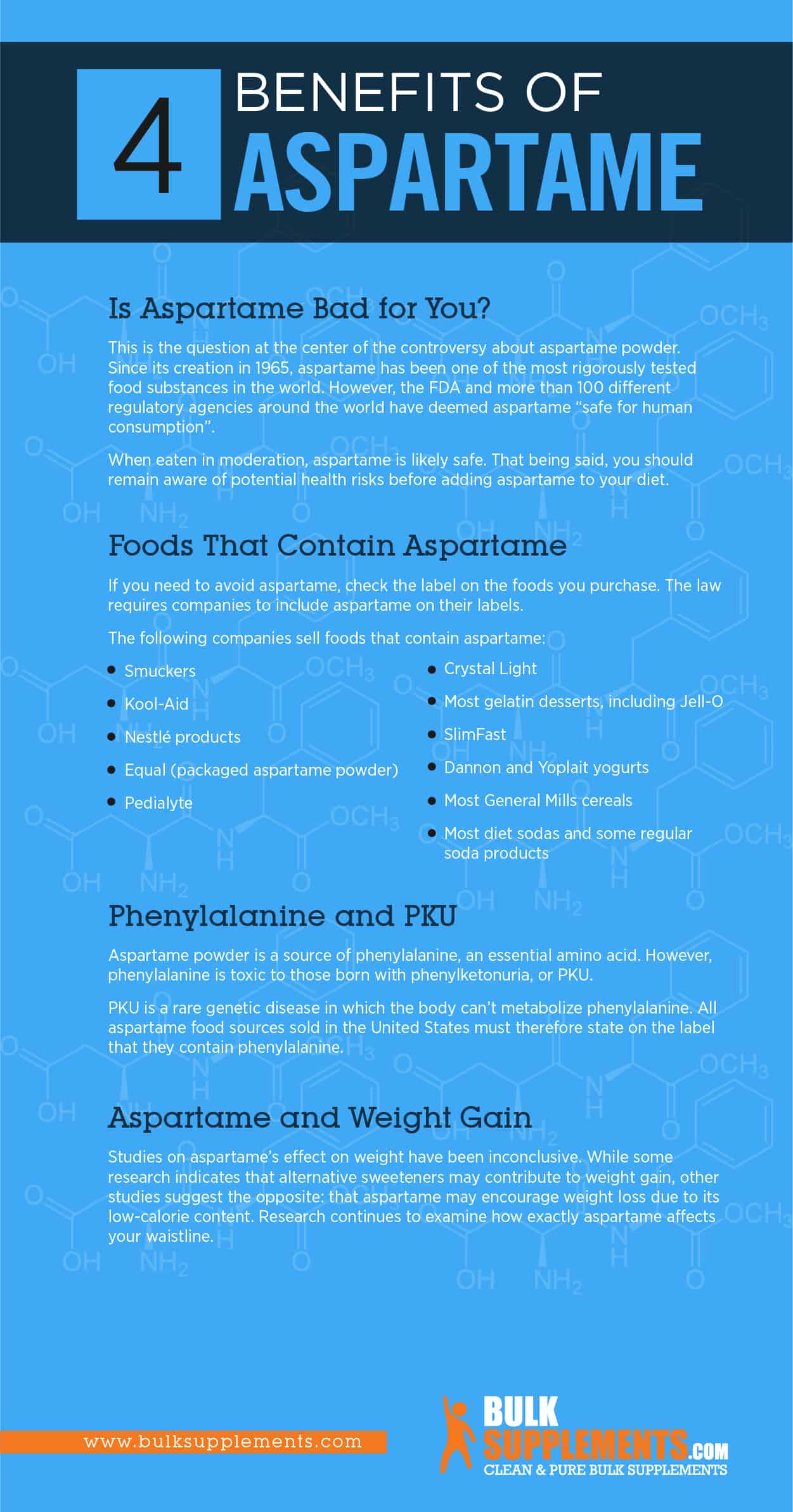Updated: 12/14/23
Are you looking to sweeten your drinks and food without adding too many extra calories? If so, aspartame powder may be the perfect choice for you. This low calorie sugar substitute contains no fat or cholesterol and can help keep calories down while still providing a sugary flavor that keeps cravings in check. With aspartame, you can enjoy all of your favorite goodies – from cakes to candy – without any of the guilt normally associated with such treats! And if weight loss is on your agenda, this ingredient should be added into the mix – it could make an incredible difference in reaching your goals!
What is Aspartame?
Aspartame powder is an artificial sweetener made from two amino acids, phenylalanine and aspartic acid. These two amino acids are found in protein-rich foods, such as meat, fish, and dairy products. When combined, they create a substance that is 200-300 times sweeter than sugar. This is why aspartame is used as a sugar substitute in many products, including diet sodas, gum, candy, and baked goods.
When ingested, aspartame breaks down into these three components – aspartic acid, phenylalanine, and methanol – in our bodies. Aspartic acid and phenylalanine are both amino acids, which means they are the building blocks of proteins. Our bodies can recognize and metabolize these amino acids, converting them into other important compounds. Methanol, which is poisonous in large amounts, is only present in very small amounts in aspartame – less than what’s present in as many fruits and vegetables we eat every day.
Aspartame was accidentally discovered in the 1960s by a chemist at Searle, a pharmaceutical company. He was working on a new anti-ulcer medication and happened to lick his finger after spilling a white powder. It turns out, that white powder was sweet too! Today, aspartame is produced by mixing aspartic acid, phenylalanine, and methanol in a specific process that has a patent held by the Ajinomoto Group.
Is Aspartame Bad for You?
Many people are concerned about the safety of aspartame and whether or not it can cause harm to the body. The good news is that the FDA has approved aspartame as safe for consumption. In fact, it has been in use in foods and drinks since the 1980s. However, some people may have an adverse reaction to aspartame, particularly those with a rare genetic condition called phenylketonuria (PKU). People with PKU are unable to break down an amino acid called phenylalanine, which is in aspartame. As a result, they must avoid consuming aspartame altogether.
How is Aspartame Different From Sugar
The key difference between aspartame and sugar is their chemical composition. Sugar, or sucrose, is a natural sweetener produced from sugar cane or sugar beets. It is a carbohydrate of both of glucose and fructose molecules. Aspartame, on the other hand, is a synthetic compound made from two amino acids – phenylalanine and aspartic acid. When these two compounds are a combination, they create a sweet taste that is 200 times sweeter than sugar.
Benefits of Aspartame
Calorie-free Sugar Alternative
Aspartame is a calorie-free alternative to sugar and it can help individuals who are looking to reduce their calorie intake, while still satisfying their sweet cravings. Studies have shown that using aspartame instead of sugar can help you lose weight and decrease your risk of diabetes and heart disease. Furthermore, it has been approved for use by the FDA, the World Health Organization and other health agencies, indicating that it is safe for human consumption.
Potential Sugar-free Option for Diabetics
Similarly, aspartame is safe for diabetics to use as well. People who are suffering from diabetes often struggle to find alternatives for sugar that won’t spike their blood sugar levels. Thankfully, aspartame is a great option for those with diabetes because it doesn’t affect the blood sugar levels in the same way that sugar does. Using aspartame in place of sugar can help you manage your blood sugars better, reduce your risk of complications, and improve your overall health.
Helps Break Bad Habits
Aspartame can even help people who are addicted to sugar break their bad habits. The sweet taste of aspartame can help individuals satisfy their sweet cravings without giving in to the unhealthy consequences of consuming sugar. By reducing your intake of sugar, you can improve your health and reduce the risk of developing chronic diseases like obesity and heart disease.
Convenient Shelf Life
Another advantage of using aspartame as opposed to sugar is that it has a longer shelf life. This means that you can store it for longer periods of time without having to worry about it spoiling or becoming stale. Aspartame has been in use in foods, drinks and other packaged products for years because of its low cost and long shelf life.
Versatile Ingredient for Cooking
Finally, aspartame is a versatile ingredient for cooking. It has the ability to replace sugar in most recipes without altering the taste or quality. Aspartame can be in use in homemade salad dressings, marinades, sauces, as well as in drinks and desserts. As it has a sweeter taste than sugar, only a small amount to achieve the same level of sweetness. As a result, it may actually be less expensive than sugar in the long run.

Side Effects of Aspartame
Weight Gain
One of the most common reasons why people switch to aspartame is because it may help them lose weight. But did you know that aspartame can actually be counterproductive to your weight loss goals? Aspartame can make people crave more sugar, leading to overeating and weight gain. In fact, according to a study, the consumption of aspartame may lead to a higher body mass index (BMI) and a greater risk for obesity.
Eye Problems
Excessive consumption of aspartame could lead to an increased risk of developing eye issues. This is because aspartame breaks down into formaldehyde, which is a toxic substance that could damage the eye’s retina. It can cause blurry vision, progressive vision loss, and eventually cataracts.
Digestive Problems
Aspartame could also cause digestive problems like bloating, gas, and diarrhea. Despite its zero-calorie claim, it can influence gut bacteria which is necessary for healthy digestion. Some people may experience more severe gastrointestinal problems like irritable bowel syndrome (IBS) after consuming aspartame. If the gut’s bacteria balance disrupts, it can lead to inflammation and various digestive issues.
Headaches and Migraines
Aspartame is famous for triggering headaches and migraines in people who are sensitive to the chemical. It is a belief that aspartame can affect the serotonin levels in the brain, leading to this adverse reaction. In some people, the headaches can be severe, leading to nausea, vomiting, and a sense of disorientation.
Increased Risk of Cancer
There have been many claims that aspartame may cause cancer. While there is no definitive evidence to support this claim, there is some research that suggests that aspartame may be links to an increasing risk of certain cancers, such as leukemia and lymphoma. These claims are still going through examinations, and further research is necessary to confirm these findings.
Neurological Issues
Aspartame can also have an impact on the brain and nervous system. It has been linked to memory loss, anxiety, depression, and seizures in some people. It is a belief that the chemicals in aspartame can block the production of neurotransmitters that are essential for brain function. This can lead to a variety of neurological symptoms that can be debilitating for some.
Phenylketonuria (PKU)
One of the most dangerous side effects of aspartame is that it can be deadly for people with a rare genetic disorder called phenylketonuria (PKU). People with PKU cannot metabolize phenylalanine, one of the amino acids found in aspartame. This leads to dangerously high levels of phenylalanine in the blood, which can cause brain damage, seizures, and even death.
Alternatives to Aspartame
Other alternative sweeteners are available if you prefer to avoid aspartame, including:
- Brown rice syrup
- Erythritol powder
- Sugar cane
- Stevia extract powder
- Agave nectar
- Coconut syrup
- Monk fruit extract powder
- Xylitol crystals
The Bottom Line
While aspartame has been the victim of some negative press over the years, scientific studies have confirmed that it is in fact safe to consume and has many benefits for our health. As a calorie-free sugar alternative, it can decrease the risk of diabetes and heart disease and aids in weight loss. Furthermore, aspartame has a longer shelf life and can help individuals break bad habits associated with sugar addiction. And lastly, aspartame is a versatile ingredient for cooking and can be used in a wide variety of recipes.
Aspartame has become increasingly popular as a sugar substitute due to its perceived effectiveness in weight loss and maintaining good health. However, the potential risks and side effects of consuming Aspartame cannot be overlooked. Hence, it’s best to be aware of the possible dangers and seek alternative healthy sweeteners like molasses, raw honey, or maple syrup. After all, health is wealth!
The statements in this article have not been evaluated by the Food and Drug Administration. These products are not intended to diagnose, treat, cure or prevent any disease.


